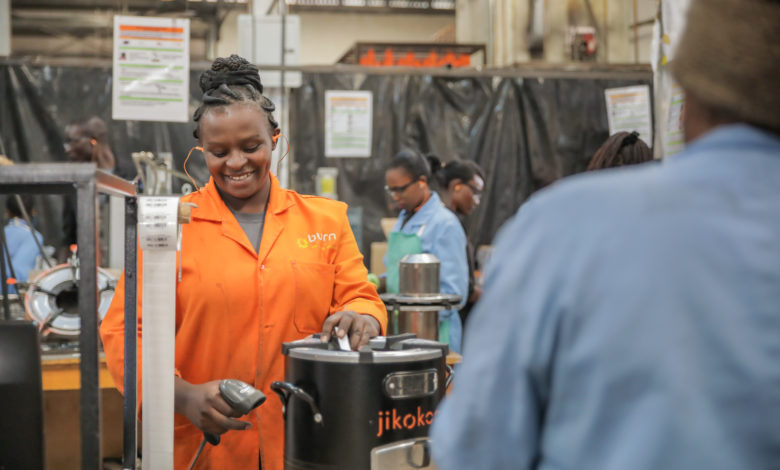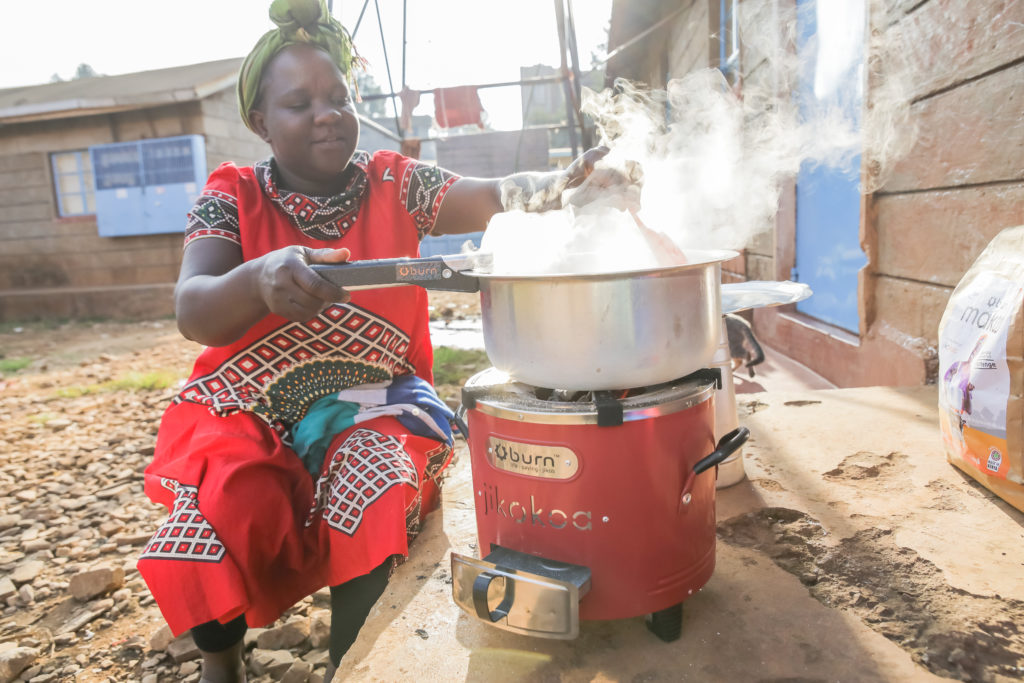Manufactures Ask For VAT Exemption
Clean cookstove and LPG manufacturers have asked Members of Parliament to oppose re-introduction of VAT tax on their products. The exemptions have contributed to increased consumption of fuel efficient and environmentally friendly products.

When RoGGKenya visited Anita Mueni’s home in Kibera, Nairobi, she was with all her three children in a single room. A stove was conspicuously placed on a table at a corner.. They were boiling beans that was donated by the government to reduce the hardships caused by Covid-19 pandemic.Steam and heat emanating from the stove warmed the house despite heavy rain and low temperatures outside.
Mueni’s cooks is not an ordinary one. She uses Jikokoa which is fuel efficient and produces very little smoke. “I now spend less money on charcoal and I don’t have to cook outside to avoid smoke,” said Mueni. She further narrates how, because of insecurity in that area, thieves steal stoves left outside the veranda together with the food.
Jikokoa is more expensive than the ordinary stoves but it is cheaper in the long run considering the amount of charcoal used. It also helps to conserve the environment.
A huge set back
The government of Kenya has been in support of clean and affordable cooking among the low income earners. As a result, clean cooking was recognised , included in government policies and development plans such as the National Climate Change Action Plan (2018-2022).
This led to steady advancement in transforming cookstoves and fuels sector, which has resulted in increased investment by the government and private sector. Further, the government introduced a Value Added Tax (VAT) exemption for clean and efficient cookstoves, as well as for the inputs used for their manufacture and assembly.
These efforts will however suffer a huge blow due to re-introduction of VAT during the 2020/2021 budget reading on 11th June.
“Introducing VAT on clean cookstoves and LPG will destroy the local clean cookstove manufacturing sector and drive Kenyans to inefficient stoves and fuels,” Said Peter Scott – CEO BURN Manufacturing.
BURN Manufacturing is a local company that makes fuel efficient cookstove called Jikokoa. The company manufactures 100% of its super fuel-efficient clean cookstoves in Kenya using local raw materials. It also employs over 400 people directly and thousands indirectly.
According to BURN, their cookstoves consume 40-70% less fuel than ordinary stoves. This has saved Kenyans over Ksh16 billion in fuel costs and over 2.8 million tons of wood. Jikokoa also emit 64-81% less smoke which reduces respiratory illnesses.
Because of the supportive environment created by the Kenyan government, BURN has invested over Ksh1.5 billion in Sub Saharan Africa’s first and only modern cookstove manufacturing facility. It also intends to make further investments to drive the Big 4 Agenda.

“Introduction of VAT threatens these investments and we ask our Members of Parliament to oppose the introduction of VAT on clean cookstoves and LPG on the Financial Bill,” said Scott while speaking to RoGGKenya.
National Assembly’s Finance and National Planning Committee chaired by Kipkelion East MP Joseph Limo , already tabled the motion in parliament.The bill is expected to be passed by Thursday 25th June 2020 before it is handed over to President Uhuru Kenyatta.
House hold Cooking Report
A report by Kenya Cooking Sector Study: Assessment of the supply and demand of cooking solutions at the household level revealed that;
1. Residential cooking emits 13.6 Mt CO2 per year.
2. 7.3 million households (59% ) in Kenya use the three stone open Fire. This is close to 28 million Kenyans.
3. 8 million households (64.5%) still use wood as their primary cooking fuel. 71% of households still use a type of wood stove with a greater prevalence of 92% in rural areas.
4. 1.7 million households use kerosene for cooking.
5. More than 21,560 people die annually due to household air pollution caused by polluting stoves. This is 5 times the number lost due to traffic accidents annually.
Accomplishments so far
The Government of Kenya has supported the creation of an enabling environment for the growth of the clean cooking sector, including by;
1. Reducing the import duty on solid biomass stoves from 25% to 10% in 2016 (however, in a major setback, the National Treasury increased the import duty from 10% to 35% in its 2018/2019 budget, and changed it to 25% in its 2019/2020 budget);
2. Implementing a tax rating of zero for Liquefied Petroleum Gas (LPG).
3. Creating a VAT exemption for plastic biogas bag digesters.
4. Removing the excise duty on denatured ethanol for cooking and heating.
5. Implementing an import duty of zero for cookstoves and their raw materials for 2019/2020.
6. Creating a VAT exemption for denatured ethanol in 2019/2020.
7. Discouraging the use of kerosene as a source of cooking fuel by increasing the excise duty, which automatically raised the retail price.
What journalists should do:
1. Research and report on how clean cookstove is contributing to conserving the environment and the economy.
2. Do an analysis of how introduction of VAT on clean cookstoves and LPG will affect production and affordability.
3. Follow parliament proceedings and update the public on the decision made concerning VAT on cleanstove and LPG.
Necessity knows no law.
Hi, I do think this is an excellent site. I stumbledupon it ;
) I’m going to come back once again since i have
saved as a favorite it. Money and freedom is the greatest way to change,
may you be rich and continue to guide others.
This is really interesting, You’re a very skilled blogger. I’ve joined your rss feed and look forward to seeking more of your wonderful post. Also, I’ve shared your website in my social networks!
I really enjoy the article. Really Cool.